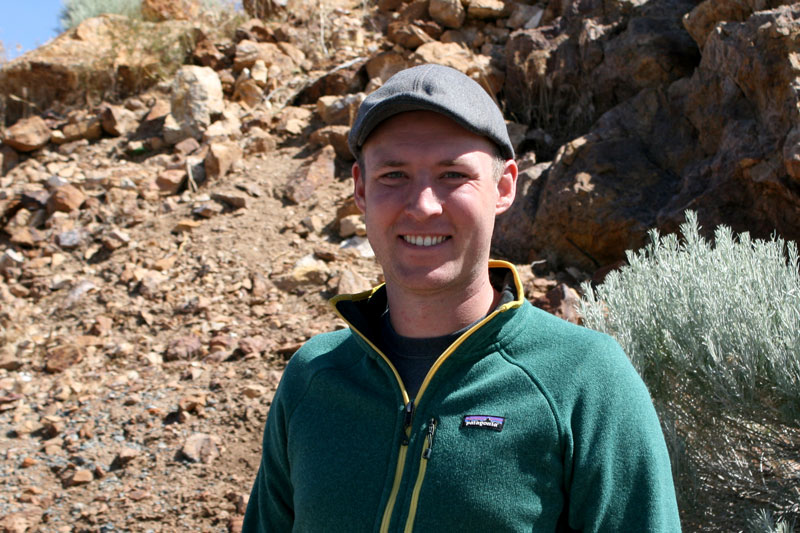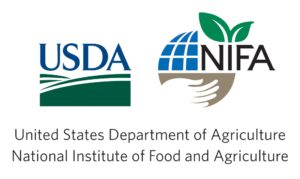Native Waters on Arid Lands Podcast
Episode 8: Reconstructing the Paleo Past with Dr. Kyle Bocinsky
In Episode 8 of the Native Waters on Arid Lands podcast, we speak with Dr. Kyle Bocinsky of the Desert Research Institute about his work as a computational archaeologist, and his role in the development of a decision support tool called SKOPE.
Kyle is an Assistant Research Professor with the Desert Research Institute, a research associate at Crow Canyon Archaeological Center and adjunct research faculty in the Department of Anthropology at Washington State University. Listen to the podcast and read below to learn more about Kyle and his work. You can subscribe to this podcast on iTunes, Google Play and Stitcher.
Studying ancient environments and cultures
As a computational archaeologist, Kyle uses computer models and simulations to learn about how environmental change impacted human societies of the past. Much of this work utilizes dendrochronological records – records of climate that can be extracted from tree rings – to understand how precipitation and temperature have varied throughout history. As Kyle explains in the podcast, he uses this tree ring data to create computer reconstructions of ancient climate patterns.
“We’ve been able to create reconstructions that go back with high confidence about 1,200 years, which is really exciting,” Kyle said. “I write computer programs that aggregate a lot of data, tree ring data and modern climatology, as a way of sending those past climate patterns back into the past.”
After preparing the climate datasets, computer simulations then help Kyle to learn about how people of ancient cultures lived and adapted during times of environmental change. Through his work with the Crow Canyon Archaeological Center’s Pueblo Farming Project, he and other researchers use paleo-climate simulations in combination with experimental gardens to learn about long term environmental change during the time period that the Hopi people developed their many different varieties of corn. They also use computer simulations as a way to try to understand decision-making strategies – for example, determining why people farmed or lived in certain areas.
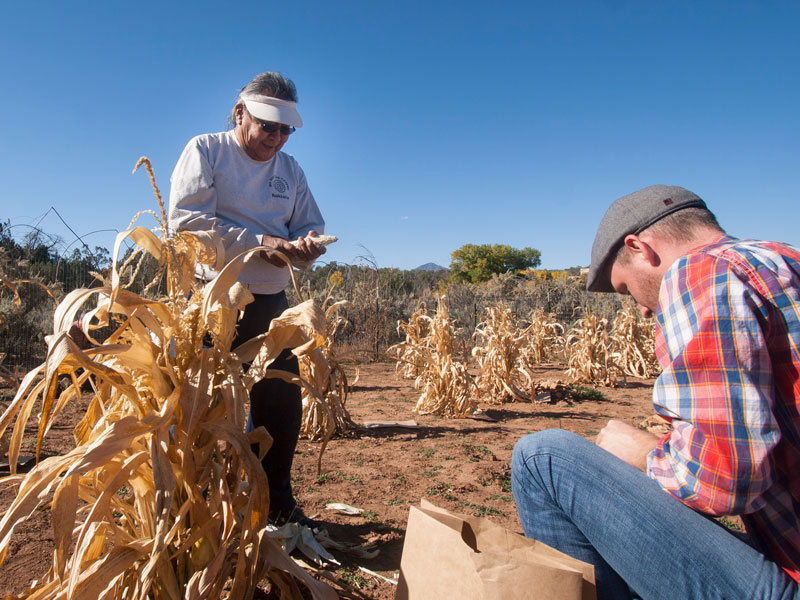
At work with the Pueblo Farming Project: Kyle and Hopi collaborators harvest corn during the 2016 season.
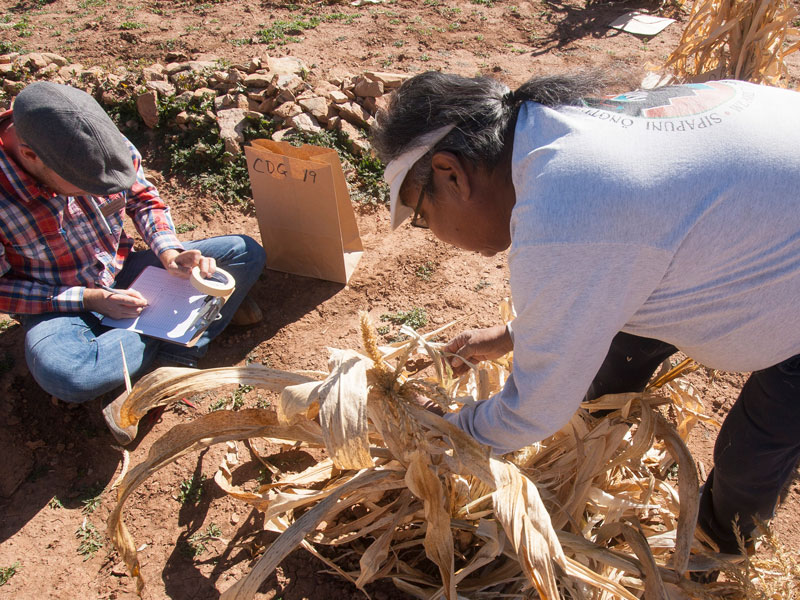
At work with the Pueblo Farming Project: Kyle and Hopi collaborators harvest corn during the 2016 season.
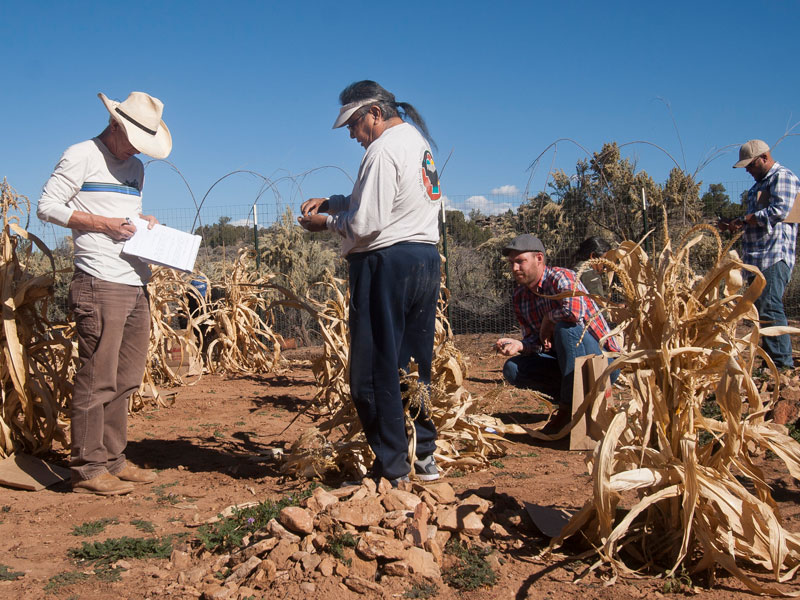
At work with the Pueblo Farming Project: Kyle and Hopi collaborators harvest corn during the 2016 season.
Developing tools for decision-makers
As part of the Native Waters project, Kyle and several members of the project team are working to provide data for tribes about how environments of the Southwest have changed from the past to the present, and how climate conditions may change in the future. To make this information easily accessible to a diverse audience, Kyle has been working on a tool called SKOPE (Synthesizing Knowledge of Past Environments).
SKOPE is an example of a decision support tool – a tool designed to take raw scientific data or other technical information and convert it to a form that can be useful to the people who need it the most. In this case, SKOPE will take the form of a web interface that can help someone sort through the available data to find what they need.
For example, a farmer in Arizona might be interested in seeing how the climate on their parcel of land has changed from the past to the present, but might not need to see the data for the entire western US. A decision support tool could help the farmer locate the data that was most relevant to them.
“Our goal in science should be to create tools that speak to particular audiences, and say, you know, what utility is this for me,” Kyle said. “I view a decision support tool as any tool that takes raw, scientific data and distills it so that it might be understood by the public and by people trying to make decisions in their lives.”
Additional Resources
- To learn more about SKOPE (Synthesizing Knowledge of Past Environments), an online resource for paleoenvironmental data and models, visit: https://www.openskope.org. A protoype of this tool is available now.
- To learn more about the Pueblo Farming Project, visit: https://www.crowcanyon.org/index.php/pueblo-farming-project
- Kyle Bocinsky was featured on Science Friday in an episode titled Climate and the Collapse of Ancient Civilizations: https://www.sciencefriday.com/person/kyle-bocinsky/
- To learn more about Kyle and his work, visit his website: http://www.bocinsky.io/
More, on the podcast
To learn more about Kynda’s work with the Native Waters on Arid Lands project, listen to podcast episode 8, below. Music for this podcast came from Podington Bear (song title: Bit Rio) on the Free Music Archive under a Creative Commons license. For a written transcript of this podcast, please contact kelsey.fitzgerald@dri.edu.
Podcast: Play in new window | Download
Subscribe: RSS

